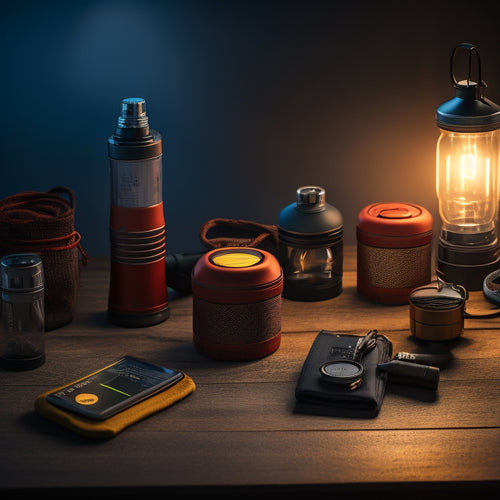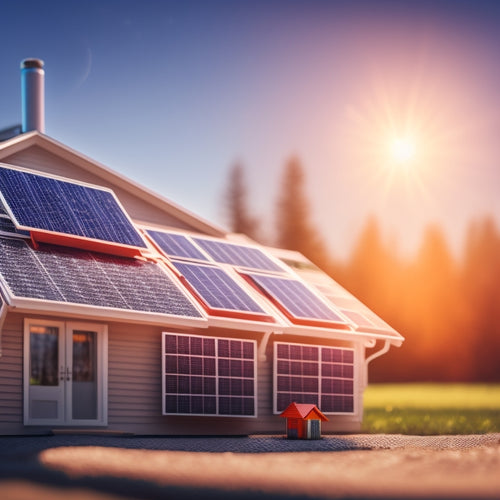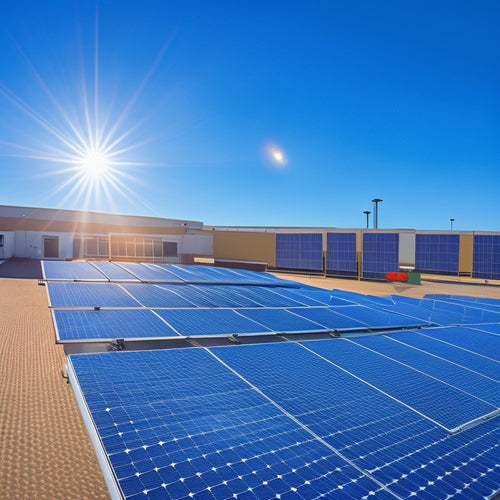
Power Batteries for Home
Share
You're considering power batteries for your home to guarantee a reliable backup power source during outages, reduce energy waste, and optimize your energy usage. By integrating with solar power, you'll achieve a sustainable energy solution that reduces reliance on noisy, polluting generators and protects against financial losses and safety risks from prolonged outages. With advanced power monitoring, you'll prioritize critical loads like refrigeration, and system monitoring enables remote control and monitoring of your power supply. As you investigate the world of power batteries for home, you'll reveal the complexities of cycle life expectancy, battery depth, and ampere-hour ratings, and uncover the key to revealing a more energy-independent future.
The Essentials
- A reliable backup power source provides uninterrupted access to essential appliances during outages, reducing reliance on noisy, polluting generators.
- Power batteries integrate with solar power to create a sustainable energy solution, offering up to 10 hours of backup for critical loads.
- Advanced power monitoring prioritizes critical loads, while power management optimizes energy usage and extends backup duration, reducing energy waste and costs.
- Energy harvesting systems capture excess energy from renewable sources, minimizing waste and maximizing independence, and energy efficiency is enhanced through smart management systems.
- Deep cycle battery technology is crucial, with factors like cycle life expectancy and battery depth influencing performance, reliability, and overall energy independence.
Reliable Backup Power Source
You need a reliable backup power source to guarantee your home remains operational during outages, and a power battery can serve as an emergency power supply.
This means you'll have uninterrupted access to essential appliances like refrigerators, medical equipment, and lighting.
With a Solar Power Backup system, you can reduce your reliance on noisy, polluting generators and the hassle of refueling them, and protect your home and its contents from the financial losses and safety risks associated with prolonged power outages.
Emergency Power Supply
During a power outage, having a reliable backup power source can be a lifesaver, literally, especially for households with critical medical equipment or refrigeration needs. You need a system that can seamlessly switch to backup power, guaranteeing uninterrupted operation of essential appliances. An emergency power supply system, integrated with solar power, can provide the freedom you need.
| Feature | Description |
|---|---|
| Automatic Transfer Switch | Switches to backup power within milliseconds of grid failure |
| Solar Integration | Utilizes solar energy to recharge your batteries and power your home |
| Power Management | Optimizes energy usage and distribution to extend backup duration |
| Energy Storage Capacity | Provides up to 10 hours of backup power for critical loads |
| System Monitoring | Allows remote monitoring and control of your emergency power supply |
With an emergency power supply system, you can rest easy that your home remains powered, even when the grid fails. The system's advanced power management capabilities guarantee that your energy storage capacity is optimized, providing you with the freedom to live life uninterrupted.
Uninterrupted Home Operations
By the time the grid fails, your emergency power supply system has already kicked in, ensuring uninterrupted home operations. You've invested in energy independence, and now you can enjoy the peace of mind that comes with it.
Your power batteries for home seamlessly integrate with your renewable energy sources, like solar or wind power, to provide a reliable backup power source. Through advanced power monitoring and load balancing, your system optimizes energy distribution, prioritizing critical loads like refrigeration and medical equipment.
With a reliable Solar Energy Storage solution, you can store excess energy generated during the day for use during the night or on cloudy days, and alleviate the burden of high energy bills. Your smart devices and home automation systems continue to function as usual, maintaining your comfortable and convenient lifestyle.
You're not dependent on the grid's whims; you've achieved grid resilience and energy security. This means you can keep your family safe, your food fresh, and your life uninterrupted. Plus, you'll start seeing cost savings as you reduce your reliance on the grid.
With sustainable living in mind, you've made a smart investment in your power batteries for home, ensuring a brighter, more independent future.
Reduced Energy Waste
You can considerably reduce energy waste in your home by investing in power batteries that integrate energy harvesting systems, which capture and convert excess energy from sources like solar panels or wind turbines.
With effective Renewable Energy Solutions, these systems optimize power usage by storing excess energy for later use, reducing the amount of energy wasted during transmission and distribution.
Energy Harvesting Systems
Frequently, homeowners overlook the potential of energy harvesting systems, which can considerably reduce energy waste in homes powered by power batteries. You can utilize energy from various sources, including solar, wind, and hydro power, to recharge your power batteries.
By integrating these renewable energy sources, you'll increase energy efficiency and reduce your reliance on the grid. Energy harvesting systems can also provide backup power during outages, ensuring your home remains powered and comfortable.
When designing an energy harvesting system, it's crucial to evaluate your energy needs and the available resources. You'll need to assess the amount of energy you can generate from each source and determine the best combination for your home.
By doing so, you'll create a reliable and efficient energy system that minimizes waste and maximizes your independence. With energy harvesting systems, you'll enjoy the freedom to generate your own power and reduce your environmental footprint.
Optimized Power Usage
Your power batteries for home can achieve ideal performance when paired with optimized power usage, reducing energy waste and maximizing efficiency.
By implementing smart energy management systems, you can monitor and control your power consumption in real-time, identifying areas where energy is being wasted. This allows you to make informed decisions about your energy usage, reducing your reliance on the grid and minimizing your environmental impact.
Power consumption optimization is a critical aspect of optimized power usage. By analyzing your energy usage patterns, you can identify opportunities to reduce your energy consumption during peak hours, shifting non-essential loads to off-peak times.
This not only reduces energy waste but also helps to prolong the lifespan of your power batteries. With optimized power usage, you can enjoy greater energy independence, reduced energy bills, and a reduced carbon footprint.
Deep Cycle Battery Technology
When selecting a deep cycle battery for your home power system, you'll want to take into account two essential factors: cycle life expectancy and battery depth.
For instance, off-grid systems often require deep cycle batteries that can handle frequent charge and discharge cycles.
The cycle life expectancy determines how many charge and discharge cycles the battery can handle before its capacity degrades, while battery depth measures the percentage of the battery's capacity that can be safely used without damaging the cells.
Cycle Life Expectancy
In deep cycle battery technology, the cycle life expectancy refers to the number of charge and discharge cycles a battery can withstand before its capacity falls below a certain threshold, typically 80% of its initial capacity. As you consider investing in a power battery for your home, understanding cycle life expectancy is essential for determining the battery's overall value and performance.
| Battery Type | Cycle Life Expectancy | Maintenance Requirements |
|---|---|---|
| Flooded Lead-Acid | 200-300 cycles | Regular watering and equalization charging |
| AGM Lead-Acid | 300-500 cycles | Minimal maintenance, occasional equalization charging |
| Lithium-Ion | 500-1000 cycles | No maintenance required, built-in battery management system |
| Gel Lead-Acid | 500-700 cycles | Minimal maintenance, occasional equalization charging |
| Calcium Lead-Acid | 200-400 cycles | Regular watering and equalization charging |
Proper battery maintenance and charging cycles greatly impact a battery's cycle life expectancy. By choosing a battery with a longer cycle life expectancy and following recommended maintenance routines, you can enjoy a reliable and efficient power source for your home.
Battery Depth Matters
You're likely aware that deep cycle batteries come in various capacities, but have you considered the significance of battery depth in relation to your power needs?
Battery depth refers to the number of discharge cycles a battery can handle before its capacity starts to degrade. A deeper battery can provide more power over a longer period, making it ideal for off-grid systems or backup power solutions.
When choosing a deep cycle battery, consider the depth of discharge (DOD) you need. A higher DOD means the battery can be drained further before recharging, but it also reduces the battery's lifespan.
Shallower batteries, on the other hand, are better suited for applications with frequent charging and discharging cycles.
Proper battery maintenance is essential to maximize charging efficiency and extend the battery's lifespan. This includes monitoring the battery's state of charge, avoiding deep discharges, and keeping the battery clean and cool.
Check Your Ampere-Hour Rating
You need to check your ampere-hour (Ah) rating because it directly impacts your battery's performance and lifespan.
A higher Ah capacity means more power storage, so it's crucial to select a battery that matches your energy needs.
When it comes to renewable energy solutions, a suitable battery capacity guarantees a reliable backup power system.
Additionally, understanding the Ah rating helps you optimize your energy harvesting and reduce blackouts.
Be certain to verify the rated capacity of your chosen battery to confirm it can handle your home's power requirements.
Ah Capacity Matters
When selecting power batteries for your home, understanding the Ah capacity is essential, as it directly affects the battery's overall performance. You need to know how much energy your battery can store to guarantee it meets your power needs.
The Ah rating represents the battery's capacity to deliver a certain amount of current over a specific period. A higher Ah rating means more energy storage, resulting in longer backup times during power outages.
To get the most out of your battery, consider your capacity planning carefully. You'll want to choose a battery with an Ah capacity that aligns with your energy requirements.
For example, if you have a small home with limited energy needs, a lower Ah capacity might be sufficient. However, if you have a larger home with multiple appliances, you'll need a higher Ah capacity to guarantee uninterrupted power supply.
Rated Capacity Check
Checking the rated capacity of your power battery is essential to guaranteeing it meets your energy requirements. You need to know how much power your battery can provide to keep your home running smoothly. The rated capacity of a battery is measured in ampere-hours (Ah), which represents the amount of electric charge it can store.
When selecting a power battery, consider the energy density, which affects the battery's efficiency. Energy density is the amount of energy stored per unit of mass or volume. A higher energy density means a more efficient battery.
Here's a comparison of different battery types and their rated capacities:
| Battery Type | Rated Capacity (Ah) |
|---|---|
| Lead-Acid | 200-400 Ah |
| Lithium-Ion | 100-300 Ah |
| Nickel-Cadmium | 150-250 Ah |
| Nickel-Metal Hydride | 100-200 Ah |
| Deep Cycle | 400-800 Ah |
Remember to check the manufacturer's specifications to guarantee the battery you choose meets your energy needs. A battery with a higher rated capacity will provide more power, but it may also be heavier and more expensive.
Longer Shelf Life Guaranteed
You're likely looking for power batteries that can sit on a shelf for an extended period without losing their charge.
With extended storage capacity, you can enjoy a longer shelf life for your batteries, which means they'll be ready to use when you need them.
This feature is especially important if you're stockpiling batteries for emergency power backup or other long-term storage applications.
Extended Storage Capacity
With the increasing demand for reliable backup power, homeowners are seeking solutions that provide extended storage capacity, assuring a longer shelf life for their batteries. You're no exception, and you want to make certain your power batteries can store enough energy to keep your home running smoothly during outages.
To achieve this, you'll need to take into account different battery types and storage solutions. Deep cycle batteries, for instance, are designed to provide a steady flow of energy over a longer period, making them ideal for extended storage capacity.
Lithium-ion batteries, on the other hand, offer higher energy density and longer lifetimes, but may come at a higher cost.
When selecting a storage solution, look for systems that can be scaled up or down to meet your specific needs. Modular battery systems, for example, allow you to add or remove batteries as needed, giving you the flexibility to adapt to changing energy demands.
Frequently Asked Questions
Can Power Batteries for Home Be Used for Outdoor Applications?
When you need outdoor power, you'll find that portable batteries can be a transformative solution, offering flexibility and convenience; you can take them anywhere, and their battery portability guarantees you're not tied down, giving you the freedom to go off-grid whenever you want.
How Do I Maintain My Power Battery's Health and Performance?
Just like a well-tuned engine, your battery's health relies on regular maintenance; you optimize its performance by monitoring temperature, keeping it charged between 20% and 80%, and updating software regularly to guarantee a prolonged battery lifespan and peak efficiency.
Are Power Batteries for Home Environmentally Friendly?
You're likely wondering if your eco-friendly choices extend to energy storage; fortunately, you'll find that most power batteries are designed with sustainability concerns in mind, boasting impressive energy efficiency that reduces your carbon footprint and supports a cleaner future.
Can I Use Power Batteries With My Existing Solar Panels?
You're likely aware that 90% of solar panels are compatible with power batteries; now, you're wondering if yours are. Fortunately, most modern solar panels can seamlessly integrate with power batteries, ensuring efficient energy storage and backup power when you need it.
Do Power Batteries for Home Require Special Installation Skills?
When installing batteries, you'll need to guarantee you meet specific installation requirements, considering safety aspects like electrical connections and ventilation, to avoid risks and guarantee peak performance, requiring some technical knowledge or professional assistance.
Final Thoughts
You've made a great decision to invest in power batteries for your home. By doing so, you'll have a reliable backup power source during outages, reduce energy waste, and benefit from deep cycle battery technology. Remember to check your ampere-hour rating to verify you get the right capacity for your needs. With a longer shelf life guaranteed, you can enjoy peace of mind knowing you're prepared for any situation. By choosing the right power battery, you'll be saving energy, reducing waste, and securing your home's power supply.
Related Posts
-

Best Solar Powered Flashlights for Emergency Situations
When you're choosing the best solar-powered flashlights for emergency situations, focus on their brightness, battery ...
-

A Beginner's Guide to Navigating the Solar Investment Tax Credit
You're eligible to claim a significant Solar Investment Tax Credit (ITC) of 30% of total installation costs, but mane...
-

Essential Solar Panel Mounts for Commercial Properties
When it comes to essential solar panel mounts for your commercial property, durability and wind resistance are key fa...


